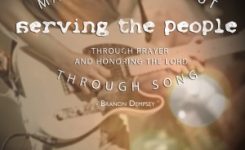Piano, Players
The Plate Spinning Pianist (Show #96)
 #Aftermath (Video Below)
#Aftermath (Video Below)
4 min read
Pain In The Piano
As a worship leader or band member, do you ever wonder how you can help develop the listening skills of your pianists? Let’s face it. Pianists are one of the most skilled musician you have on your team.They enter life, learning piano by the age of five. From scales to Minuets, from recitals to a Degree in Piano performance. However, when it comes to playing of the chart and improvising, this skill is underdeveloped. How do you help them raise the bar?
Pianists are incredible! Their fingers can move like lightning and their precision is like thunder, and they can read and play anything you put in front of them. But when you put that chord chart or lead sheet before their eyes, they glaze over and freeze like a deer in the headlights. Also, when it comes to the thought of playing by ear, it seems too tasking and unattainable. What do you do?
Is this you or someone in your team? Knowing what to play and how to play can make a huge difference in the sound of your team. At the same time, how can learning more about other instruments such as synth keyboards and music sounding devices help aid the sound skill of your pianists?
WATCH SHOW #96!
Do You Hear What I Hear?
Don’t give up! The one thing I keep hearing from classically trained pianists is: “how do I learn how to play by ear, and not so much lean on the sheet music?” This question could not be more perfect! Many pianists struggle with this reality. Some claim that learning by ear is a natural born thing; others claim that it’s nearly impossible. Well I’m here to tell you that you can still learn! True, you may not be born with the gift of playing by ear, but that doesn’t mean you can’t develop listening skills / just as you did with developing sight reading skills. Like learning how to read sheet music, playing by ear takes time, it doesn’t happen over night. Learning to develop your listening skills + your sight reading skills only makes you that much more stronger as a player and incredible asset to your team!
The number one thing we must all learn is patience. Better a few notes learned, than a cacophony of sound. “…But he who restrains his lips is wise.” Prov. 10.19 same can be said for us musicians. I’ve learned to play it safe as soon as I hit my thirties. One of my other music mentors cautioned me by saying: Be Low, Go Slow and Don’t Mo.
Song Tutorial of the Week: “Aftermath” “Aftermath” written by Joel Houston © 2010 Hillsong Music Publishing (Admin. by Capitol CMG Publishing)
Get the Full Track of Music Loops and Stems on GuideTracks.coTheme of the week: #Aftermath
The Plate Spinning Pianist
1. Be Low
Your worship team is made up of many members and function (should) as one body. For the pianist, this is a different world. Learning how to play contemporary music is one thing, playing with a band is another. Pianists learn how to spin three plates at one time: melody, harmony and rhythm.Being low refers to assuming a lesser role in the team and not the dominator in juggling all three parts. What is most difficult for pianists is to let two or all three of these plates fall. I often explain this at our many Weekend Workshops for worship teams.
Plate one is your melody – the singers and electric lead player. Let them lead. Plate two is your harmony; this would be the acoustic guitar player, other chordal instrument and you (the pianist). Plate three is your rhythm; this refers to both your drummer and bassist – the backbone of the band.
So where’s your place, that right, plate two. Remember, you also share this same plate with 2 or more other players. So be low, share the space and contribute to what’s being served. How do you do this?
2. Go Slow
Every pianist (like any eager band beaver) wants to plow full speed ahead. Both hands are flying up and down the keys like the Sound of Music. So how do both the Pianist and other musicians share the space and pace? Tie both hands of the pianist behind their backs! Really.It’s about learning to listen, think and respond. If you were in a conversation with another person and all they did was talk, talk, talk, talk…. and talk some more. You might feel awkward or frustrated that you can’t breathe in a word.
Music is no different. Listening more than you play is a quality mark of a musician. Going slow involves creating space, not minimizing it. When I play piano, I constantly listen back to a particular order: vocal, drums, bass, and guitars. You may wonder: vocals first?
Yes, because ultimately, that’s who is leading the congregation lyrically. They also set the syllable-rhythmic pace, as the drummer and bass provide the foundation of tempo and pulse. The acoustic players are holding the key, time and chords changes together.
As a pianist, look at your team like a map of conversation. Listen first, think before you play and respond appropriately. Listen to how what you play – gels with the rest.
3. Don’t Mo
Not the three stooges, but your skills in chart reading, chord building and improvising. Learn to become a student of the chord chart and lead sheet. No, it’s not created by the devil; it’s another systematic way for short hand reading for musicians.Just open up any Music History text book under 15th / 16th Century Music and you will see a single line melody and few chords of Gregorian Chant – there’s your lead sheet. In Early Greek and Egyptian Music, they use to inscribe letter note names on their instruments – there’s your chord chart.
Look guys, you just have to overcome a fear of the unknown, especially after 20-50 years of learning to play one way. Trust me, it’s ok. You can do it.
“Music is not from the black and white, it’s from the heart.” @BranonDempsey
Other Ways to Develop Your Listening Skills
Get with a guitar player and ask him or her for a chord-building chart. Let’s hope they have one! Learn to become a student of building and naming chords. Take your time and listen to their sounding quality. Improvising is another animal in its own zoo. My advice is to listen to music, better yet a live jazz combo. Pick out what the pianist is doing, how they play, what they play and when they play it. Practice with a guitar player and a metronome.
Let them lead and learn how to evenly fill in the gaps. Don’t mo them over. In closing, If you fully immerse yourself in learning how to play less, you will be surprised to learn what your former piano teacher NEVER told you.
Theme of the week: Play and be led by the Spirit.
Enjoy listening and contributing to your team. Fall in love all over again in learning how to play in a new way. It WILL inspire your creativity and transform your musicianship. Have fun and may God bless you richly!
@BranonDempsey @worshiptt
 How can your worship team benefit from learning new vocals techniques, creative ideas for your band and be inspired to transform your ministry into worship unity? Get motivated. Get a custom WeekendWorkshop that comes to you!
How can your worship team benefit from learning new vocals techniques, creative ideas for your band and be inspired to transform your ministry into worship unity? Get motivated. Get a custom WeekendWorkshop that comes to you! Copyright 2016 Worship Team Training®









